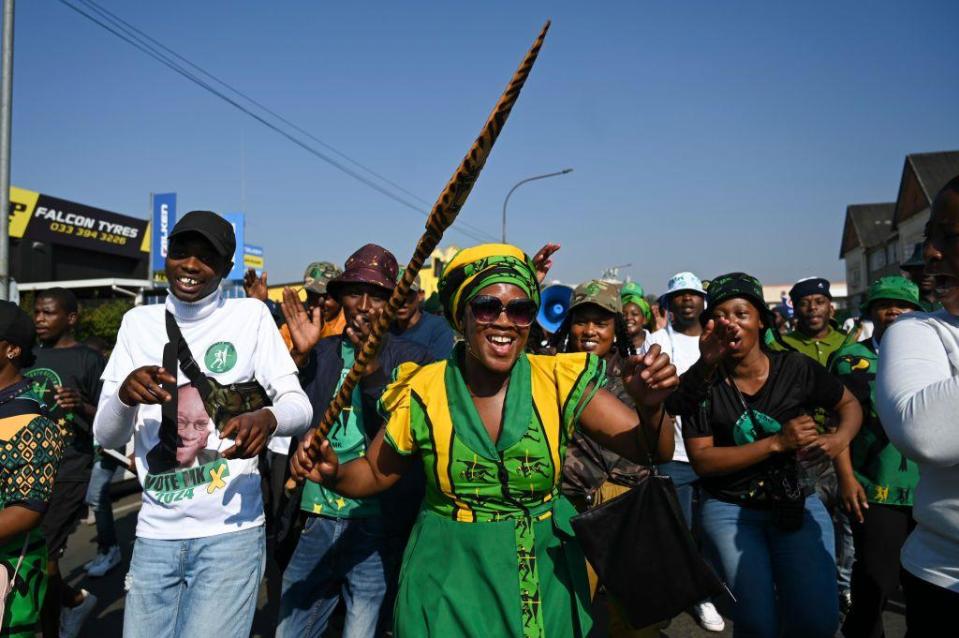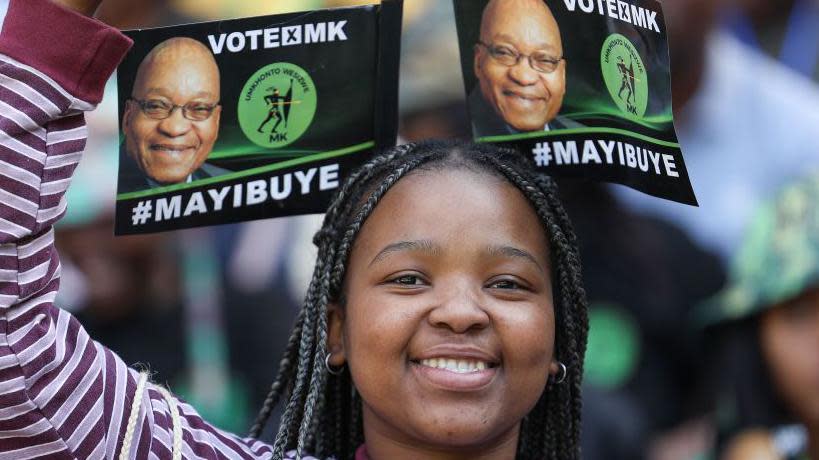In a sign of the seismic political shifts in South Africa, John Hlophe, a once-celebrated judge whose career ended ignominiously with his impeachment just five months ago, has been parachuted into parliament to lead the official opposition.
Dr Hlophe is expected to be in full swing on Friday when he will open the debate in response to President Cyril RamaphosaThe President’s speech on Thursday, setting out his new coalition government’s plans to solve South Africa’s numerous problems – including a 32% unemployment rate, high levels of crime, deteriorating infrastructure and property land in a nation plagued by racial inequality.
“Watch this space. Watch him perform on Friday,” Dr Hlophe’s lawyer Barnabas Xulu told the BBC.
Dr Hlophe’s dramatic fall as a judge – and meteoric rise as a politician – can be attributed to the former president Jacob ZumaSouth Africa’s most polarizing politician who defied the odds by making his own stunning comeback in the May 29 general election.
Less than three years after becoming the first South African president to be jailed for a crime – contempt of court – Zuma led his newly formed party, uMkhonto weSizwe (Spear of the Nation) to third place in the elections.
But as he was prevented from taking his seat in parliament due to the 15-month prison sentence he received, Mr Zuma turned to Dr Hlophe to take on the important role of Leader of the Opposition.
The post comes with an annual salary of just under 1.7 million rand ($94,000; £73,000)which Dr Hlophe will likely appreciate after reportedly losing his judge’s pension because of his impeachment for gross misconduct.
MK became the official opposition because the second largest party, the Democratic Alliance (DA), joined President Ramaphosa’s coalition government after his African National Congress (ANC) lost its majority in elections for the first time since the end of the racist campaign. apartheid system in 1994.
Born in 1959, Dr Hlophe, who grew up as a child laborer in a family where his mother was a maid and gardener and his father a security guard and traditional healer, went on to study law locally and abroad, obtaining a PhD from the A prestigious University of Cambridge, in the United Kingdom.
As a lawyer in South Africa, he participated in court battles challenging draconian laws of the apartheid regime, before embarking on an academic career, returning to Cambridge as a tutor in Roman law in 1987.
Despite this, Dr. Hlophe is a staunch supporter of the “Africanization” of South Africa’s legal system, saying that it was “imposed on us” by the colonizers, and that “we dominate, in fact, even better than they do” – a comment he made in a speech addressed to the African Legal Practitioners Association in the coastal city of Durban shortly after joining MK in June.
“African law has never been allowed to develop and take its rightful place,” he added.
Dr Hlophe returned to the topic after being sworn in as MP, saying MK was “not apologetic in our call for the law to be Africanised”.
“By this we mean that we bring back the laws that used to govern the African people. One of those laws is this: land in Africa can never be the subject of private property. The land belongs to the nation,” he said.

Some critics viewed Zuma’s decision to appoint him as MK’s parliamentary leader as repaying a political favor.
His impeachment in February ended a long saga that began in 2008, when two judges of South Africa’s highest court sent shockwaves through legal and political circles, accusing him of trying to unduly influence them into ruling in favor of Zuma in a case related to corruption. case that the controversial politician was fighting at the time.
Hlophe denied the allegations, with Xulu telling the BBC that he simply had a “casual conversation” with the two judges about “legal principles” in a “new” case – something judges often do among themselves.
Xulu said that with the state no longer prepared to pay his legal bills, Dr Hlophe decided to abandon the battle to clear his name in favor of a career in politics, joining MK as it was his “ideal” political home “.
“He wasn’t going to sit at home and be idle,” Xulu said.
“He will continue the fight for justice and transformation on a different platform, the National Assembly, where he will have more freedom, more protection,” Xulu added.
Dr. Hlophe’s impeachment marked a sad end to his judicial career, as he was once among the cream of South Africa’s judges, or, as constitutional law expert Narnia Bohler-Muller said in The Conversation magazine, he was “brilliant and controversial, on and off the bench”.
At the age of 35, in 1995, just a year after the end of apartheid, he made history by becoming the first defense judge in the Western Cape province of South Africa, and five years later its Presiding Judge.
But his leadership was turbulent, as he accused some of his colleagues of treating him as a “legal non-entity” and undermining him because he was black. He faced counter-accusations of being verbally abusive and even assaulting a judge, which he dismissed as a malicious allegation based on rumors and gossip.
He has also been embroiled in numerous other controversies – including allegations that he served as a non-executive director at a financial company and received around $26,000 over three years in consultancy fees..
He denied any wrongdoing, saying he had declared his links with the company to the then Minister of Justice. The Judicial Services Commission (JSC) dismissed a case against him over the matter, saying there was a lack of evidence.
Now, he has become the first former judge to become not only the Leader of the Opposition, but also a member of the parliament’s justice committee and, to top it all off, the MK representative in the JSC.
Made up of cross-party judges and MPs, the JSC is the same body that found Dr Hlophe guilty of serious misconduct, which led to his impeachment by Parliament.
He is also responsible for the appointment of judges and will choose his successor as Judge President of the Western Cape.
His long-time opponents have vowed to challenge his elevation to the JSC in court, with campaign group Freedom Under Law saying it was “irrational” for an impeached judge to be involved in the appointment of other judges.


Significantly, the ANC supported his appointment to the JSC, while two of its coalition partners, the DA and the Afrikaner Nationalist Freedom Plus Front, opposed it.
William Gumede, an academic at Wits University’s School of Governance in Johannesburg, said the ANC’s decision was not a surprise.
“There will be big battles with MK, but this is not a battle the ANC was prepared to fight because it could have set the wrong tone for the opening of parliament,” Professor Gumede told the BBC.
Furthermore, the ANC had to take into account the fact that Dr Hlophe remained popular despite his impeachment, said Prof Gumede.
“Many black voters don’t seem to care about supporting people implicated in the abuse of public office if those people can present themselves as victims of a conspiracy, supposedly from ‘the system,'” he added.
He said a lot now depends on Dr Hlophe’s performance in parliament.
“If he provides an effective opposition, MK could grow and he could potentially be its next leader,” Professor Gumede added.
This is a far cry from the 65-year-old’s childhood as a sugar cane farmer whom he called “filthy rich” — a man who helped finance his college education.
“I grew up poor, like most South Africans,” he said on a podcast organized by the Economic Freedom Fighters (EFF), an opposition party with which MK formed an alliance in parliament.
“I started weeding sugarcane fields when I was 12 years old. He carried 12kg of fertilizer on his back and didn’t look back. We worked a lot, even at Christmas and holidays. there were no labor laws at that time,” Dr Hlophe added.
His comments are a poignant reminder of black life under white minority rule — and of the racial and ideological divisions that cut across a country where black people have only been allowed to vote for 30 years.
More BBC stories from South Africa:


Go to BBCAfrica.com for more news from the African continent.
Follow us on Twitter @BBCAfricaon Facebook at BBC Africa or on Instagram at bbcafrica















/cdn.vox-cdn.com/uploads/chorus_asset/file/24090214/STK171_VRG_Illo_4_Normand_ElonMusk_04.jpg?w=300&resize=300,300&ssl=1)







/cdn.vox-cdn.com/uploads/chorus_asset/file/23925966/acastro_STK045_01.jpg?w=300&resize=300,300&ssl=1)










